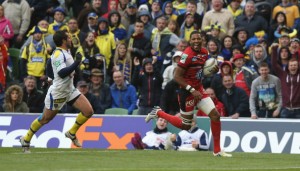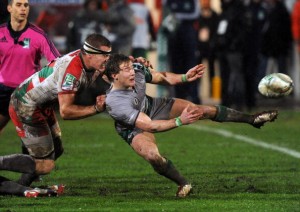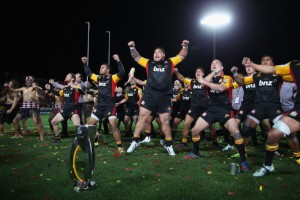
Raise your hands if you have any questions: Derek McGrath of ERC has had a lot of work to do recently
AS YET another round of press releases about the future of the ERC and the Heineken and Amlin Challenge Cups whizzes around the atmosphere like so many deflating balloons, it becomes apparent, that the whole sorry debate affair will slide on through the year.
Potentially saddening, it would have been nice if this had been nipped in the bud early, but alas that is not to be. Maybe no one was aware of the oncoming problems? Maybe no one was asking questions before.
Then it hits us. Rugby World editor Owain Jones sat down with ERC chief executive Derek McGrath and asked him about a number of issues last year. Here are a few of those questions (some/most of them still so painfully relevant):
Rugby World: Attendances are rising year-on-year. Does this mean you have perfected your ticketing policy?
Derek McGrath: We’ve listened and learnt that a happy club and fans means a happy event. We’re careful with our pricing. The clubs sell 76 of the games and we work with them so they can promote fixtures. We’re careful how to position them and present a differentiated product to fans.
When Saracens approached us about going to Cape Town, we tried to make it work but it didn’t come off. However, we’ve been to San Sebastián with Biarritz and Geneva with Bourgoin and we’re always looking at new initiatives to grow our fan base. Where we control the pricing, we ask what can fans afford.
RW: Last year’s turnover was €50m (£40m). Are you happy with your allocation of funds to the competing clubs?
DM: All the money we generate goes straight back to the clubs, except for the tournament running costs. We don’t count it as a success for the ERC but as a success for all the participating clubs and unions. Decisions are made after clubs have been consulted. We’ve had challenges along the way, for example when ITV Digital disappeared, and had to scrutinize costs and take hard decisions. Our message to the clubs was not to forget how special the Heineken is and now it has gone on to become established as a serious sporting event and not just in rugby.
Our raised profile has allowed us to develop commercially. If you look at other events, like the Premier League, its reach goes beyond these shores. We’re not in that bracket but the same dynamics are clear.
RW: How can the competitions improve and what changes can we expect to their structure?
DM: We had a good look at the structure in 2008 and made changes to the Amlin Cup. It was important to improve the quality and exposure of the competition. In our view the Heineken Cup must remain the ‘best of the best’.
What overrides both competitions is that we must keep quality at the core. The 24 sides in the Heineken Cup are the elite and the Amlin Challenge Cup provides the rest. Clubs have to think whether to develop young players or try to win and qualify for the Heineken Cup the following year. Another factor is inviting sides from other countries, as we have done with teams from Romania and Spain. We’ve also received interest from Georgia, Russia and Portugal, who are looking to reap the benefits of playing in European competition. That’s a space we’ll look to develop more.
RW: Is it wrong that some teams go into the Heineken Cup every year, while others have to qualify?
DM: It’s an issue that is up for debate. There have been calls for the RaboDirect Pro12 to be more meritocratic in its qualification and that is something we will discuss in the next 12-18 months.
That said, there is a different qualification criteria for every country. They all come to the European table to participate yet have their own needs. In Britain, we look to countries to decide.
We then opened up the questions for you, the fans. Here is how some of those questions went…
Q: Do you think we will ever see a European Super League?
DM: It’s some way off. A European Super League could change the number of clubs operating, which would be a shame. Take the Aviva Premiership: they’ve worked hard supporting relegation and using the salary cap to provide sustainable opportunities for participating clubs.
Q: As CEO, you’ve helped raise the profile of the Heineken Cup. What was the turning point in achieving this?
DM: It was making the hard decisions at really tough times when it would have been easier to take a short-term view. Competition success only comes if your competitors are also thriving. Locally, the appointment of referee manager Donal Courtney is symbolic because it’s no use developing referees from one country.
Europe is a neutral competition. We need the other five countries’ referees to be developing. That’s why we’ve put plans in place to raise the standards. That’s the most important principle of all, working together.
Q: Why can’t we have a game between the Heineken Cup winners and the southern hemisphere’s best team?
DM: This has been a discussion point from the year I came in, in 2000. It’s an excellent idea in theory but can only be executed if it’s right for everyone. The obvious hurdles are the rugby calendar and timing. We’ve discussed this with SANZAR, but it keeps bouncing back to where it would fit.
To proceed, the match would have to be sustainable as an event so that both sides could take time to prepare for it properly and take it seriously.








